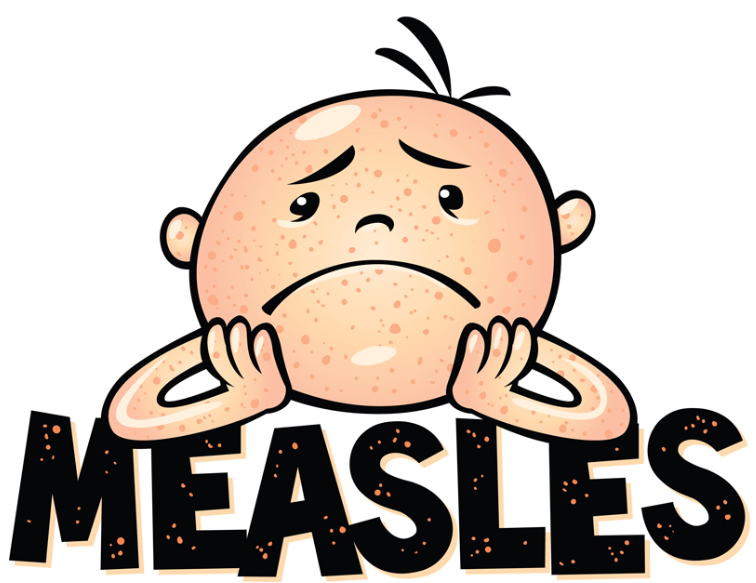Introduction
Measles is a highly contagious viral infection caused by the measles virus (a member of the Paramyxoviridae family). While most cases resolve within a couple of weeks, measles is far from harmless. The virus can weaken the immune system for several weeks or even months, leaving the body vulnerable to other infections. In some cases, measles leads to serious and potentially fatal complications. Three of the most severe are pneumonia, encephalitis, and subacute sclerosing panencephalitis (SSPE).
Understanding these complications is crucial for recognizing the importance of vaccination and early medical care.
Pneumonia: The Leading Cause of Measles-Related Deaths
Pneumonia is the most common and serious complication of measles, responsible for the majority of measles-related deaths—especially in young children and people with weakened immune systems.
- How It Develops:
The measles virus damages the respiratory tract’s protective lining, making the lungs more susceptible to secondary bacterial infections (Streptococcus pneumoniae, Haemophilus influenzae) or viral pneumonia directly caused by the measles virus. - Symptoms:
- Persistent high fever
- Cough and difficulty breathing
- Chest pain
- Rapid breathing and bluish lips/fingertips in severe cases
- Risks:
Infants, malnourished children, pregnant women, and immunocompromised individuals are at the highest risk. Without timely treatment, pneumonia can progress quickly to respiratory failure. - Treatment:
Supportive care, oxygen therapy, antibiotics for bacterial infections, and in severe cases, hospitalization.
Encephalitis: Inflammation of the Brain
Encephalitis is a rare but extremely serious measles complication, occurring in about 1 in 1,000 cases.
- How It Develops:
The virus invades the central nervous system, triggering inflammation and swelling of the brain tissue. This can occur during the acute measles infection or shortly afterward. - Symptoms:
- Severe headache
- High fever
- Seizures
- Confusion, disorientation, or personality changes
- Coma in severe cases
- Risks and Outcomes:
Encephalitis can lead to permanent neurological damage, including hearing loss, intellectual disability, or paralysis. Mortality rates range from 10–15%, and survivors may have long-term impairments. - Treatment:
There is no specific antiviral treatment; care focuses on reducing brain swelling, controlling seizures, and maintaining vital functions.
Subacute Sclerosing Panencephalitis (SSPE): The Delayed Threat
SSPE is a rare but fatal degenerative brain disorder that appears years after a measles infection—typically 7 to 10 years later.
- How It Develops:
The measles virus remains dormant in brain tissue after the initial infection. For reasons not fully understood, it can reactivate and slowly destroy brain cells over time. - Symptoms (progressive):
- Decline in school performance or cognitive abilities
- Personality changes and memory loss
- Muscle spasms and seizures
- Loss of motor control and vision
- Eventually, coma and death
- Risks:
SSPE is more likely to occur in children who contract measles before age 2. The incidence is estimated at 4–11 cases per 100,000 measles infections, but the risk rises in areas with low vaccination rates. - Treatment:
There is no cure. Some antiviral drugs and immune therapies may slow progression, but SSPE is almost always fatal within 1–3 years after diagnosis.
Prevention is Key
The measles, mumps, and rubella (MMR) vaccine is highly effective—about 97% protection after two doses. Vaccination not only prevents the initial infection but also eliminates the risk of these devastating complications.
Conclusion
Measles is often wrongly dismissed as a “mild childhood illness,” but its complications tell a different story. Pneumonia, encephalitis, and SSPE can cause lifelong disabilities or death. The most powerful defense against these outcomes is widespread vaccination and timely medical care. By protecting ourselves and our communities, we can prevent not just measles but the tragic consequences it leaves behind.
FAQs
Can adults get measles complications?
Yes. Although more common in children, adults—especially unvaccinated ones—can also develop severe measles complications.
How soon after measles can encephalitis appear?
It usually occurs within days to weeks after the rash appears.
Is SSPE contagious?
No. SSPE is a late complication caused by the reactivation of the measles virus within the brain and cannot be spread to others.
If I had measles as a child, can I still get SSPE?
Yes, although the risk is low. SSPE may develop many years after the original infection.
Can pneumonia from measles be treated at home?
Mild cases may be treated at home with medical guidance, but severe symptoms require immediate hospitalization.






